Video: “Wiping Gaza Off The Map”: Big Money Agenda. Confiscating Palestine’s Maritime Natural Gas Reserves
Video Interview with Michel Chossudovsky
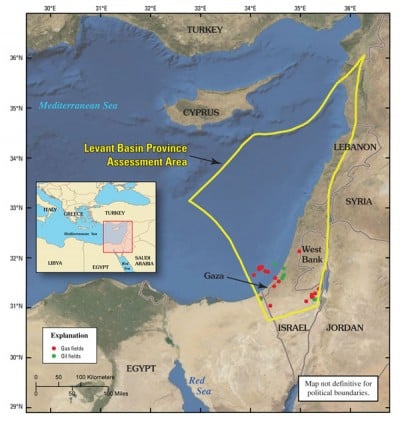
Introduction
Israel has launched an invasion (October 7, 2023) of the Gaza Strip.
As outlined by Felicity Arbuthnot with foresight 10 years ago in a December, 30 2013 article:
“Israel is set to become a major exporter of gas and some oil, “If All Goes to Plan”.
In the current context, Israel’s “All Goes to Plan” option consists in bypassing Palestine and “Wiping Gaza off the Map”, as well confiscating ALL Gaza’s maritime offshore gas reserves, worth billions of dollars.
The ultimate objective is not only to exclude Palestinians from their homeland, it consists in confiscating the multi-billion dollar Gaza offshore Natural Gas reserves, namely those pertaining to the BG (BG Group) in 1999, as well the Levant discoveries of 2013.
Update. Israel’s Secret Intelligence Memorandum
An official “secret” memorandum authored by Israel’s Ministry of Intelligence “is recommending the forcible and permanent transfer of the Gaza Strip’s 2.2 million Palestinian residents to Egypt’s Sinai Peninsula”, namely to a refugee camp in Egyptian territory. There are indications of Israel-Egypt negotiations as well as consultations with the U.S.
The 10-page document, dated Oct. 13, 2023, bears the logo of the Intelligence Ministry … assesses three options regarding the future of the Palestinians in the Gaza Strip … It recommends a full population transfer as its preferred course of action. … The document, whose authenticity was confirmed by the ministry, has been translated into English in full here on +972. See below, click here or below to access complete document (10 pages)
First published on October 22, 2023. Video added on October 27, 2023, Update, November 1, 2023
***
Video: Michel Chossudovsky, Interview with Caroline Mailloux, Lux Media
To leave a comment and/or Access Rumble click to lower right hand corner
Felicity Arbuthnot’s 2013 Analysis
“The Giant Leviathan natural gas field, in the eastern Mediterranean, discovered in December 2010, widely described [by governments and media] as “off the coast of Israel.”
These Levant reserves must be distinguished from those discovered in Gaza in 1999 by British Gas, which belong to Palestine. Felicity Arbuthnot’s analysis nonetheless confirms that “Part of the Leviathan Gas fields lie in Gazan territorial waters” (See Map Below).
Whilst Israel claims them as her very own treasure trove, only a fraction of the sea’s wealth lies in Israel’s bailiwick as maps. Much is still unexplored, but currently Palestine’s Gaza and the West Bank between them show the greatest discoveries… (Felicity Arbuthnot, 2013)
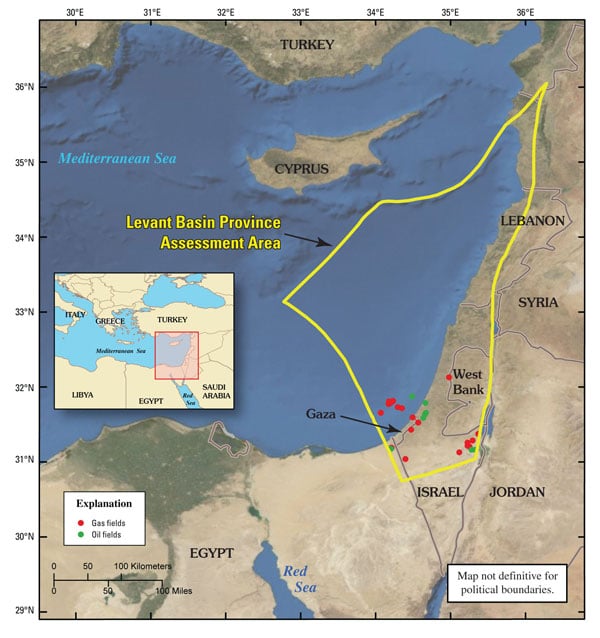
Flash Forward to October 2023
Netanyahu’s October 2023 declaration of war against 2.3 million people of the Gaza Strip is a continuation of its 2008-2009 invasion of Gaza under “Operation Cast Lead.”
The underlying objective is the outright military occupation of Gaza by Israel’s IDF forces and the expulsion of Palestinians from their homeland.
.
The ultimate objective is not only to exclude Palestinians from their homeland, it consists in confiscating the multi-billion dollar Gaza offshore Natural Gas reserves, namely those pertaining to the BG (BG Group) in 1999, as well the Levant discoveries of 2013.
Egypt-Israel “Secret Bilateral Talks”
In 2021-22, Egypt and Israel were involved in “secret bilateral talks” regarding “the extraction of natural gas off the coast of the Gaza Strip.
“Egypt succeeded in persuading Israel to start extracting natural gas off the coast of the Gaza Strip, after several months of secret bilateral talks.
This development … comes after years of Israeli objections to extract natural gas off the coast of Gaza on [alleged] security grounds, …
British Gas (BG Group) has also been dealing with the Tel Aviv government.
What is significant is that the civilian arm of the Hamas Gaza government has been bypassed in regards to exploration and development rights over the gas fields:
The field, which lies about 30 kilometers (19 miles) west of the Gaza coast, was discovered in 2000 by British Gas (currently BG Group) and is estimated to contain more than 1 trillion cubic feet of natural gas.
The official in the Egyptian intelligence service told Al-Monitor on condition of anonymity, “An Egyptian economic and security delegation discussed with the Israeli side for several months the issue of allowing the extraction of natural gas off the coast of Gaza. …Al-Monitor, October 22, 2022
A Memorandum of Understanding was signed between Egypt and Israel, which had the rubber-stamp of the Palestinian National Authority (PA):
“The Egyptian official explained that Israel required the start of practical measures to extract gas from the Gaza fields at the beginning of 2024, to ensure its own security. (Al-Monitor, October 22, 2022
Netanyahu’s Timeline: “Before The Beginning of 2024”
The timeline resulting from these bilateral Israel-Egypt “secret talks” i.e. confiscation of Palestine’s offshore Maritime Gas Reserves is “The Beginning of 2024”.
United Nations Assessment
An important United Nations Conference on Trade and Development (UNCTAD) (2019) report describes Palestine’s predicament as follows:
Geologists and natural resources economists have confirmed that the Occupied Palestinian Territory lies above sizeable reservoirs of oil and natural gas wealth, in Area C of the occupied West Bank and the Mediterranean coast off the Gaza Strip.
However, occupation continues to prevent Palestinians from developing their energy fields so as to exploit and benefit from such assets. As such, the Palestinian people have been denied the benefits of using this natural resource to finance socioeconomic development and meet their need for energy.
The accumulated losses are estimated in the billions of dollars. The longer Israel prevents Palestinians from exploiting their own oil and natural gas reserves, the greater the opportunity costs and the greater the total costs of the occupation borne by Palestinians become.
This study identifies and assesses existing and potential Palestinian oil and natural gas reserves that could be exploited for the benefit of the Palestinian people, which Israel is either preventing them from exploiting or is exploiting without due regard for international law. (UNCTAD, August 2019, emphasis added, download complete report)
Crimes against Humanity
In the words of Netanyahu who is on Record for Supporting and Financing a faction within Hamas:
“Anyone who wants to thwart the establishment of a Palestinian state has to support bolstering Hamas and transferring money to Hamas … This is part of our strategy – to isolate the Palestinians in Gaza from the Palestinians in the West Bank.”
(Benjamin Netanyahu, statement at a March 2019 meeting of his Likud Party’s Knesset members, Haaretz, October 9, 2023, emphasis added)
“Hamas was treated as a partner to the detriment of the Palestinian Authority to prevent Abbas from moving towards creating a Palestinian State. Hamas was promoted from a terrorist group to an organization with which Israel conducted negotiations through Egypt, and which was allowed to receive suitcases containing millions of dollars from Qatar through the Gaza crossings.”
(Times of Israel, October 8, 2023, emphasis added)
Crimes against humanity beyond description by the Netanyahu government against the People of Palestine,
Crimes also committed against the People of Israel who are the victims of the Hamas “False Flag Attack” carefully engineered by Mossad-IDF.
There are deep-seated divisions within Hamas. Our “False Flag” analysis pertains to a military-intelligence faction within Hamas which cooperates with Israeli and U.S. intelligence. See:
By , October 20, 2023
Michel Chossudovsky, Global Research, October 21, 2023
Below is the 2013 article by Felicity Arbuthnot
Israel Gas-Oil and Trouble in the Levant
by Felicity Arbuthnot
Global Research,
December 13, 2013
Israel is set to become a major exporter of gas and some oil, if all goes to plan. The giant Leviathan natural gas field, in the eastern Mediterranean, discovered in December 2010, is widely described as “off the coast of Israel.”
At the time the gas field was:
“ … the most prominent field ever found in the sub-explored area of the Levantine Basin, which covers about 83,000 square kilometres of the eastern Mediterranean region.” (i)
Coupled with Tamar field, in the same location, discovered in 2009, the prospects are for an energy bonanza for Israel, for Houston, Texas based Noble Energy and partners Delek Drilling, Avner Oil Exploration and Ratio Oil Exploration.
Also involved is Perth, Australia-based Woodside Petroleum, which has signed a memorandum of understanding for a thirty percent stake in the project, in negotiations which have been described as “up and down.”
There is currently speculation that Woodside might pull out of the deal: “ …since the original plans to refrigerate the gas for export were pursued when relations between Israel and Turkey were strained. That has changed, more recently, which has opened the door for gas to be piped to Turkey.”
The spoils of the Leviathan field has already expanded from an estimated 16.7 trillion cubic feet (tcf ) of gas to nineteen trillion – and counting:
”We’ve discovered nearly 40 tcf of gas, and we have roughly 19 tcf of that gas that’s available for export to both regional and extra-regional markets. We see exports reaching 2 billion cubic feet a day in capacity in the next decade. And we continue to explore.”, stated Noble Vice Chairman Keith Elliot (ii) There are also estimated to be possibly six hundred million barrels of oil, according to Michael Economides of energytribune.com (“Eastern Mediterranean Energy – the next Great Game.”)
However, even these estimates may prove modest. In their: “Assessment of Undiscovered Oil and Gas Resources of the Levant Basin Province, Eastern Mediterranean”, the US Department of the Interior’s US Geological Survey, wrote in 2010:
“We estimated a mean of 1.7 billion barrels of recoverable oil and a mean of 122 trillion cubic feet of recoverable gas in this province using a geology based assessment methodology.”
Nevertheless, Woodside Petroleum, might also be hesitant to become involved in further disputes, since they are already embroiled, with the Australian government, in a protracted one in East Timor relating to the bonanaza of energy and minerals beneath the Timor Sea, which has even led to East Timor accusing Australia “of bugging East Timorese officials during the negotiations over the agreement.”(iii)
Woodside’s conflict in East Timor however, may well pale against what might well erupt over the Leviathan and Tamar fields. The area is not for nothing called the Levantine Basin.
Whilst Israel claims them as her very own treasure trove, only a fraction of the sea’s wealth lies in Israel’s bailiwick as maps (iv, v, see below) clearly show.
Much is still unexplored, but currently Palestine’s Gaza and the West Bank between them show the greatest discoveries, with anything found in Lebanon and Syria’s territorial waters sure to involve claims from both countries.
In a pre-emptive move, on Christmas Day, Syria announced a deal with Russia to explore 2,190 kilometres (850 Sq. miles) for oil and gas off its Mediterranean coast, to be: “… financed by Russia, and should oil and gas be discovered in commercial quantities, Moscow will recover the exploration costs.”
Syrian Oil Minister, Ali Abbas said during the signing ceremony that the contract covers “25 years, over several phases.”
Syria, increasingly crippled by international sanctions, has seen oil production plummet by ninety percent since the largely Western fermented unrest began in March 2011. Gas production has nearly halved, from thirty million cubic metres a day, to 16.7 cubic metres daily.
The agreement is reported to have resulted from “months of long negotiations” between the two countries. Russia, as one of the Syrian government’s main backers, looks set to also become a major player in the Levant Basin’s energy wealth. (vi)
Lebanon disputes Israel’s map of the Israeli-Lebanese maritime border, filing their own map and claims with the UN in 2010. Israel claims Lebanon is in the process of granting oil and gas exploration licenses in what Israel claims as its “exclusive economic zone.”
That the US in the guise of Vice President Joe Biden, as honest broker, acting peace negotiator in the maritime border dispute would be laughable, were it not potential for Israel to attack their neighbour again. In a visit to Israel in March 2010, Biden announced: “There is absolutely no space between the United States and Israel when it comes to Israel’s security- none at all”, also announcing on arrival in Israel:”It’s good to be home.”
Given US decades of “peace brokering” between Israel and Palestine, this is already a road of pitfalls, one sidedness and duplicity, well traveled. There is trouble ahead.
Oh, and in demonology, Leviathan is one of the seven princes of Hell.
Notes
i. http://www.offshore-technology.com/projects/leviathan-gas-field-levantine-israel/
ii. http://m.theage.com.au/business/options-widen-for-woodsides-leviathan-partners-20131219-2znu6.html
iii. http://www.abc.net.au/news/2013-09-04/east-timor-offers-funds-for-onshore- gas-processing/4933106
iv. http://www.offshore-technology.com/projects/leviathan-gas-field-levantine-israel/leviathan-gas-field-levantine-israel1.html
v. http://www.google.co.uk/search?q=Leviathan+gas+project+Israel+map&tbm=isch&tbo=u&source=univ&sa=X&ei=ntC2UvO7IcPE7Ab7rIDYCQ&ved=0CEQQsAQ&biw=1017&bih=598
vi. http://www.phantomreport.com/syria-inks-oil-gas-deal-with-russia-firm#more-20238
****
Michel Chossudovsky’s
Video: War and Natural Gas: The Israeli Invasion and Gaza’s Offshore Gas Fields
By , April 25, 2024
Almost fifteen years ago in December 2008, Israel invaded Gaza under “Operation Cast Lead (2008-2009)”.
The following article was first published by Global Research in January 2009 at the height of the Israeli bombing and invasion under Operation Cast Lead.
War and Natural Gas:
The Israeli Invasion and Gaza’s Offshore Gas Fields
by Michel Chossudovsky
January 8, 2009
The December 2008 military invasion of the Gaza Strip by Israeli Forces bears a direct relation to the control and ownership of strategic offshore gas reserves.
This is a war of conquest. Discovered in 2000, there are extensive gas reserves off the Gaza coastline.
British Gas (BG Group) and its partner, the Athens based Consolidated Contractors International Company (CCC) owned by Lebanon’s Sabbagh and Koury families, were granted oil and gas exploration rights in a 25 year agreement signed in November 1999 with the Palestinian Authority.
The rights to the offshore gas field are respectively British Gas (60 percent); Consolidated Contractors (CCC) (30 percent); and the Investment Fund of the Palestinian Authority (10 percent). (Haaretz, October 21, 2007).
The PA-BG-CCC agreement includes field development and the construction of a gas pipeline.(Middle East Economic Digest, Jan 5, 2001).
The BG licence covers the entire Gazan offshore marine area, which is contiguous to several Israeli offshore gas facilities. (See Map below). It should be noted that 60 percent of the gas reserves along the Gaza-Israel coastline belong to Palestine.
The BG Group drilled two wells in 2000: Gaza Marine-1 and Gaza Marine-2. Reserves are estimated by British Gas to be of the order of 1.4 trillion cubic feet, valued at approximately 4 billion dollars. These are the figures made public by British Gas. The size of Palestine’s gas reserves could be much larger.
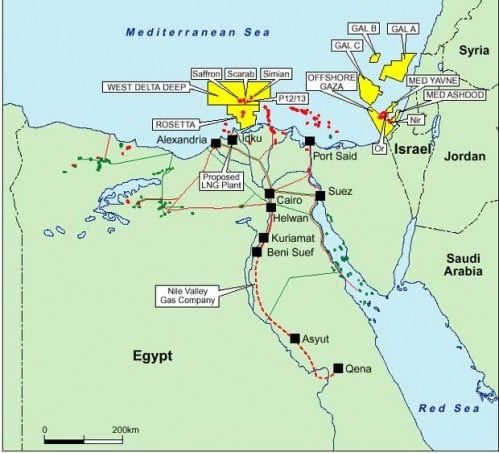
Map 1
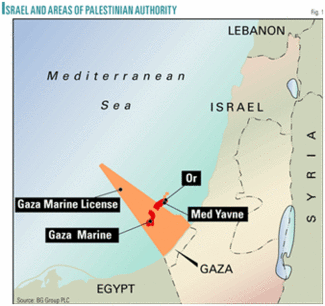
Map 2
Who Owns the Gas Fields
The issue of sovereignty over Gaza’s gas fields is crucial. From a legal standpoint, the gas reserves belong to Palestine.
The death of Yasser Arafat, the election of the Hamas government and the ruin of the Palestinian Authority have enabled Israel to establish de facto control over Gaza’s offshore gas reserves.
British Gas (BG Group) has been dealing with the Tel Aviv government. In turn, the Hamas government has been bypassed in regards to exploration and development rights over the gas fields.
The election of Prime Minister Ariel Sharon in 2001 was a major turning point. Palestine’s sovereignty over the offshore gas fields was challenged in the Israeli Supreme Court. Sharon stated unequivocally that “Israel would never buy gas from Palestine” intimating that Gaza’s offshore gas reserves belong to Israel.
In 2003, Ariel Sharon, vetoed an initial deal, which would allow British Gas to supply Israel with natural gas from Gaza’s offshore wells. (The Independent, August 19, 2003)
The election victory of Hamas in 2006 was conducive to the demise of the Palestinian Authority, which became confined to the West Bank, under the proxy regime of Mahmoud Abbas.
In 2006, British Gas “was close to signing a deal to pump the gas to Egypt.” (Times, May, 23, 2007). According to reports, British Prime Minister Tony Blair intervened on behalf of Israel with a view to shunting the agreement with Egypt.
The following year, in May 2007, the Israeli Cabinet approved a proposal by Prime Minister Ehud Olmert “to buy gas from the Palestinian Authority.” The proposed contract was for $4 billion, with profits of the order of $2 billion of which one billion was to go the Palestinians.
Tel Aviv, however, had no intention on sharing the revenues with Palestine. An Israeli team of negotiators was set up by the Israeli Cabinet to thrash out a deal with the BG Group, bypassing both the Hamas government and the Palestinian Authority:
“Israeli defence authorities want the Palestinians to be paid in goods and services and insist that no money go to the Hamas-controlled Government.” (Ibid, emphasis added)
The objective was essentially to nullify the contract signed in 1999 between the BG Group and the Palestinian Authority under Yasser Arafat.
Under the proposed 2007 agreement with BG, Palestinian gas from Gaza’s offshore wells was to be channeled by an undersea pipeline to the Israeli seaport of Ashkelon, thereby transferring control over the sale of the natural gas to Israel.
The deal fell through. The negotiations were suspended:
“Mossad Chief Meir Dagan opposed the transaction on security grounds, that the proceeds would fund terror”. (Member of Knesset Gilad Erdan, Address to the Knesset on “The Intention of Deputy Prime Minister Ehud Olmert to Purchase Gas from the Palestinians When Payment Will Serve Hamas,” March 1, 2006, quoted in Lt. Gen. (ret.) Moshe Yaalon, Does the Prospective Purchase of British Gas from Gaza’s Coastal Waters Threaten Israel’s National Security? Jerusalem Center for Public Affairs, October 2007)
Israel’s intent was to foreclose the possibility that royalties be paid to the Palestinians. In December 2007, The BG Group withdrew from the negotiations with Israel and in January 2008 they closed their office in Israel.(BG website).
Invasion Plan on The Drawing Board
The invasion plan of the Gaza Strip under “Operation Cast Lead” was set in motion in June 2008, according to Israeli military sources:
“Sources in the defense establishment said Defense Minister Ehud Barak instructed the Israel Defense Forces to prepare for the operation over six months ago [June or before June] , even as Israel was beginning to negotiate a ceasefire agreement with Hamas.”(Barak Ravid, Operation “Cast Lead”: Israeli Air Force strike followed months of planning, Haaretz, December 27, 2008)
That very same month, the Israeli authorities contacted British Gas, with a view to resuming crucial negotiations pertaining to the purchase of Gaza’s natural gas:
“Both Ministry of Finance director general Yarom Ariav and Ministry of National Infrastructures director general Hezi Kugler agreed to inform BG of Israel’s wish to renew the talks.
The sources added that BG has not yet officially responded to Israel’s request, but that company executives would probably come to Israel in a few weeks to hold talks with government officials.” (Globes online- Israel’s Business Arena, June 23, 2008)
The decision to speed up negotiations with British Gas (BG Group) coincided, chronologically, with the planning of the invasion of Gaza initiated in June. It would appear that Israel was anxious to reach an agreement with the BG Group prior to the invasion, which was already in an advanced planning stage.
Moreover, these negotiations with British Gas were conducted by the Ehud Olmert government with the knowledge that a military invasion was on the drawing board. In all likelihood, a new “post war” political-territorial arrangement for the Gaza strip was also being contemplated by the Israeli government.
In fact, negotiations between British Gas and Israeli officials were ongoing in October 2008, 2-3 months prior to the commencement of the bombings on December 27th.
In November 2008, the Israeli Ministry of Finance and the Ministry of National Infrastructures instructed Israel Electric Corporation (IEC) to enter into negotiations with British Gas, on the purchase of natural gas from the BG’s offshore concession in Gaza. (Globes, November 13, 2008)
“Ministry of Finance director general Yarom Ariav and Ministry of National Infrastructures director general Hezi Kugler wrote to IEC CEO Amos Lasker recently, informing him of the government’s decision to allow negotiations to go forward, in line with the framework proposal it approved earlier this year.
The IEC board, headed by chairman Moti Friedman, approved the principles of the framework proposal a few weeks ago. The talks with BG Group will begin once the board approves the exemption from a tender.” (Globes Nov. 13, 2008)
Gaza and Energy Geopolitics
The military occupation of Gaza is intent upon transferring the sovereignty of the gas fields to Israel in violation of international law.
What can we expect in the wake of the invasion?
What is the intent of Israel with regard to Palestine’s Natural Gas reserves?
A new territorial arrangement, with the stationing of Israeli and/or “peacekeeping” troops?
The militarization of the entire Gaza coastline, which is strategic for Israel?
The outright confiscation of Palestinian gas fields and the unilateral declaration of Israeli sovereignty over Gaza’s maritime areas?
If this were to occur, the Gaza gas fields would be integrated into Israel’s offshore installations, which are contiguous to those of the Gaza Strip. (See Map 1 above)
These various offshore installations are also linked up to Israel’s energy transport corridor, extending from the port of Eilat, which is an oil pipeline terminal, on the Red Sea to the seaport – pipeline terminal at Ashkelon, and northwards to Haifa, and eventually linking up through a proposed Israeli-Turkish pipeline with the Turkish port of Ceyhan.
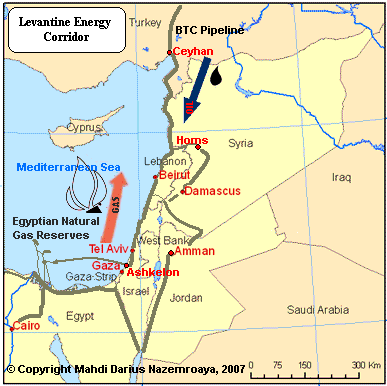
Map 3
Ceyhan is the terminal of the Baku, Tblisi Ceyhan Trans Caspian pipeline.
“What is envisaged is to link the BTC pipeline to the Trans-Israel Eilat-Ashkelon pipeline, also known as Israel’s Tipline.” (See Michel Chossudovsky, The War on Lebanon and the Battle for Oil, Global Research, July 23, 2006)
Readers’ Thanks to Michel Chossudovsky


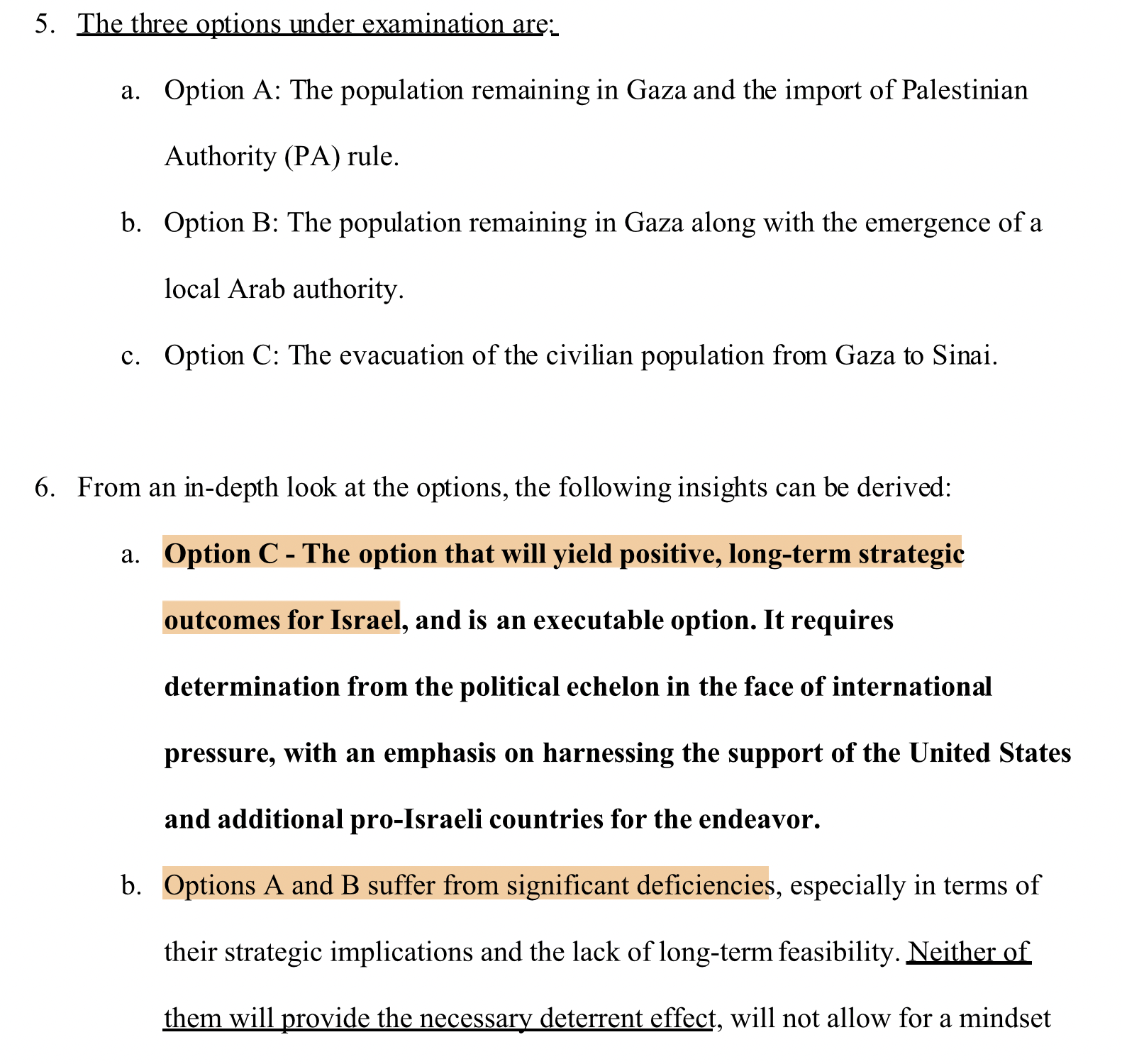


Thank you for your continued activism and truth-telling. A thankless task but the right thing.
You Sir are a Canadian hero. Thank you for your wonderful site and all the fine work you have done over the many years I have followed your work.
Michel Chossudovsky, you are a voice of reason and understanding. Thank you for your awareness. I am a Syrian/American. I heard one voice during the bombing of Gaza of a child screaming for his father and his father could not reach him, but he cried out to him, “PUT YOUR HEART ON MY HEART.” Those humans who are putting your Heart on Palestine, thank you.